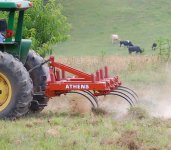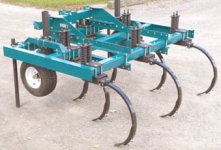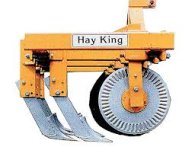ChisholmRanch
New member
Hi everyone. I'm a newbie here in all senses. This is my first post, and I am about to be a new tractor owner. I'm enjoying reading through the threads but I haven't found specific advice concerning my largest issue right now, so I thought I would post my own thread.
I live in TX and have awful clay gumbo soil. We have 20 acres of large pastures for our horses. This year we had huge amounts of rain followed by nothing but 100 degree heat. This is my first year on this property, and in a matter of days, from when we first saw small cracks, the ground started splitting in spots. We have irrigated the pastures, and along the irrigation pipe ditches there were cracks we knew to be watching and monitoring, filling and compacting. However, EVERYWHERE else through the pastures the soil also has cracked.
Two weeks ago, under some heavy grasses, there were cracks 5 inches wide and a foot or so deep. One of our horses got a hoof caught and broke a leg. He has had surgery and is maybe going to make it, but it has been an overwhelming experience for all of us.
I;ve been paying contractors to come in and cut the pastures as needed while we settled into our patterns and decided the tractor and attachments we needed for our farm. With this latest situation, I have ground work we need to be doing and we will be buying the tractor in the next week or so. I've decided on John Deere because of the friendliness and help of the local dealer.
I'm looking for advice from all of those more experienced with me on what in the heck I should be planning on to maintain my pastures so that this never happens again. Obviously we will stay on top of the irrigation needs of the ground and not just the grass, but that seems quite wasteful to me to keep the ground watered more than the grass needs. Rather than do that to excess, I would like to work the ground with the tractor and hopefully conserve such an important resource. I've also received advice to completely disc under the entire pastures and replant replacing our native grasses with a hybrid bermuda that may hold the ground together better.
I am completely lost here as to what to do. Ideally, I would like to create pastures that we do not have to work heavily year in and year out. Does anyone have any advice for us where we are right now? My current plan is to disc over the largest cracks and try and keep areas of grasses for grazing. We'll select our LEAST cracked pasture and only turn out there while we completely re-establish the others. I'm hoping I can get 10 acres or so disced and done and prepared for us to plant a hybrid bermuda to still get established before the fall, but am I likely not going to make it?
Does anyone have opinions on if I disc the entire pasture and reseed, will I have hopes of avoiding these types of cracking issues again, or am I going to be discing every year? And if so, does that mean I will be losing all my grasses, having to close down pastures for months at a time following discing to then allow grass to grow before turning horses out?
I know this post is a little scattered, but I'm hoping there are some more experienced folks that spur a discussion here so I can be as prepared to handle this as I can be.
I live in TX and have awful clay gumbo soil. We have 20 acres of large pastures for our horses. This year we had huge amounts of rain followed by nothing but 100 degree heat. This is my first year on this property, and in a matter of days, from when we first saw small cracks, the ground started splitting in spots. We have irrigated the pastures, and along the irrigation pipe ditches there were cracks we knew to be watching and monitoring, filling and compacting. However, EVERYWHERE else through the pastures the soil also has cracked.
Two weeks ago, under some heavy grasses, there were cracks 5 inches wide and a foot or so deep. One of our horses got a hoof caught and broke a leg. He has had surgery and is maybe going to make it, but it has been an overwhelming experience for all of us.
I;ve been paying contractors to come in and cut the pastures as needed while we settled into our patterns and decided the tractor and attachments we needed for our farm. With this latest situation, I have ground work we need to be doing and we will be buying the tractor in the next week or so. I've decided on John Deere because of the friendliness and help of the local dealer.
I'm looking for advice from all of those more experienced with me on what in the heck I should be planning on to maintain my pastures so that this never happens again. Obviously we will stay on top of the irrigation needs of the ground and not just the grass, but that seems quite wasteful to me to keep the ground watered more than the grass needs. Rather than do that to excess, I would like to work the ground with the tractor and hopefully conserve such an important resource. I've also received advice to completely disc under the entire pastures and replant replacing our native grasses with a hybrid bermuda that may hold the ground together better.
I am completely lost here as to what to do. Ideally, I would like to create pastures that we do not have to work heavily year in and year out. Does anyone have any advice for us where we are right now? My current plan is to disc over the largest cracks and try and keep areas of grasses for grazing. We'll select our LEAST cracked pasture and only turn out there while we completely re-establish the others. I'm hoping I can get 10 acres or so disced and done and prepared for us to plant a hybrid bermuda to still get established before the fall, but am I likely not going to make it?
Does anyone have opinions on if I disc the entire pasture and reseed, will I have hopes of avoiding these types of cracking issues again, or am I going to be discing every year? And if so, does that mean I will be losing all my grasses, having to close down pastures for months at a time following discing to then allow grass to grow before turning horses out?
I know this post is a little scattered, but I'm hoping there are some more experienced folks that spur a discussion here so I can be as prepared to handle this as I can be.



